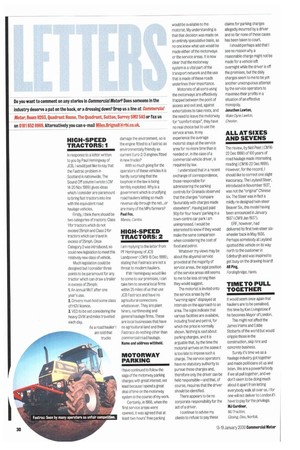MOTORWAY PARKING
Page 32

If you've noticed an error in this article please click here to report it so we can fix it.
I have continued to follow the saga of the motorway parking charges with great interest, not least because I spend a great deal of time on the motorway system in the course of my work.
Certainly, in 1966, when the first service areas were opened, it was agreed that at least two hours' free parking would be available to the motorist. My understanding is that that decision was made on an entirely speculative basis, as no one knew what use would be made either of the motorways or the service areas. It is now clear that the motorway system is a vital part of the transport network and the use that is made of these roads underlines their importance.
Motorists of all sorts using the motorways are effectively trapped between the point of access and exit and, against exhortations to take rests, and the need to leave the motorway for "comfort stops", they have no real choice but to use the service areas. In my experience the average motorist stays at the service area for no more time than is needed or, in the case of a commercial vehicle driver, is required by law.
I understand that in a recent exchange of correspondence, those responsible for administering the parking controls for Granada observed that the charges "compare favourably with charges made elsewhere". Having just paid 90p for four hours' parking in a town-centre car park lam unimpressed. I would be interested to know if they would make the same comparison when considering the cost of food and petrol.
Whatever my views may be about the abysmal service provided at the majority of service areas, the legal position of the service areas still seems to me to be less strong than they would su est.
The motorist is invited onto the service areas by the "warning signs" displayed at intervals on the approach to an area. The signs indicate that various facilities are available, including food and petrol, for which the price is normally shown. Nothing is said about parking charges, and it is arguable that, by the time the motorist arrives on the scene it is too late to impose such a charge. The service operators have no statutory authority to pursue these charges and, therefore only the driver can be held responsible—and that, of course, requires that the driver should be identified.
There appears to be no corporate responsibility for the act of a driver.
I continue to advise my clients to refuse to pay these claims for parking charges allegedly incurred by a driver and so far none of these cases has been taken to court.
I should perhaps add that I see no reason why a reasonable charge might not be made for a vehicle left overnight while the driver is off the premises, but the daily charges seem to me to be yet another unscrupulous attempt by the service operators to maximise their profits in a situation of an effective monopoly.
Jonathon Lawton, Wake Dyne Lawton, Chester.




















































































































